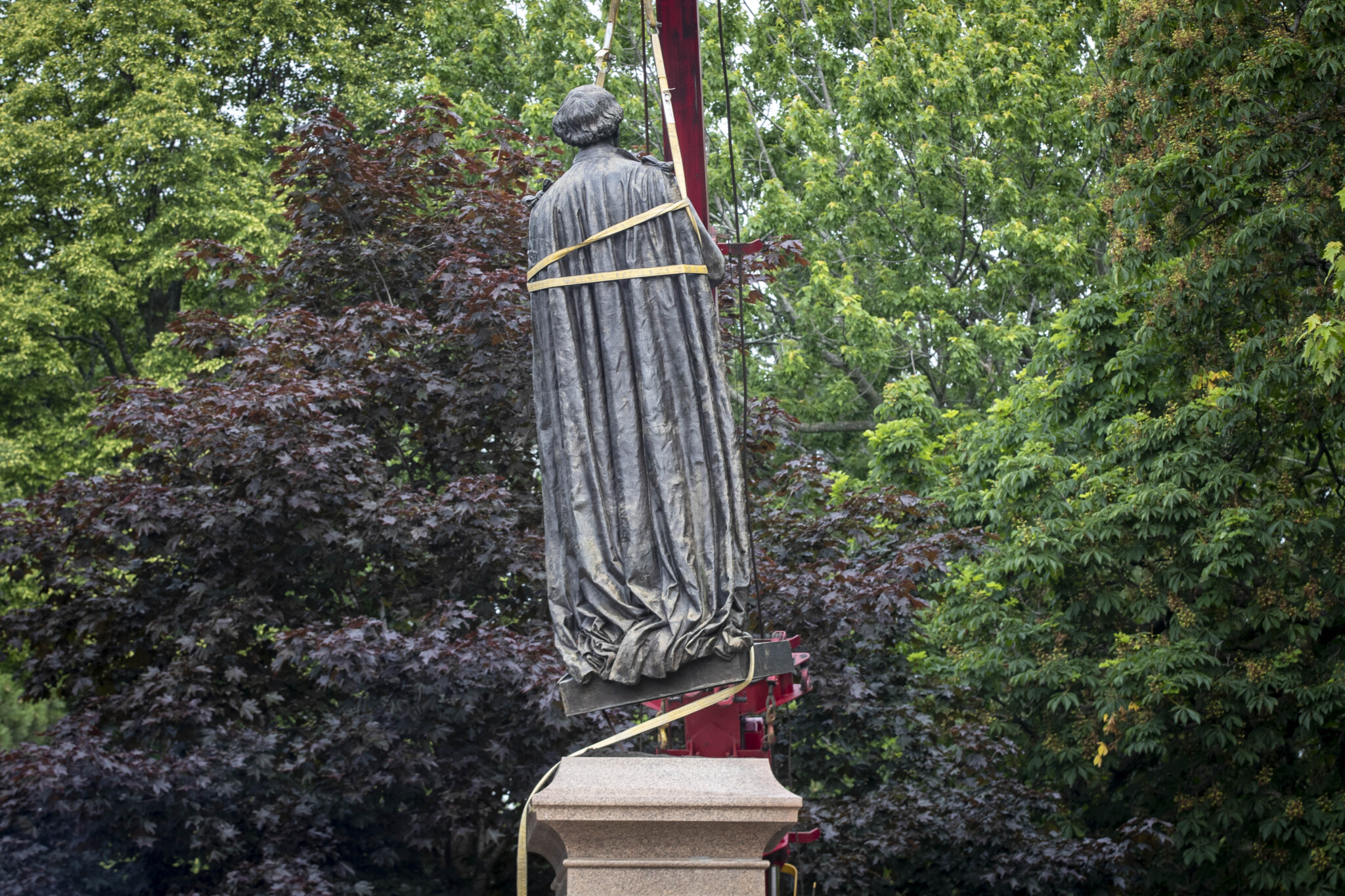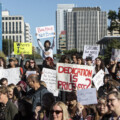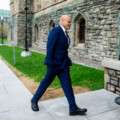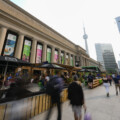Crumbling is not an instant’s Act
A fundamental pause
Dilapidation’s processes
Are organized Decays.
~Emily Dickinson
It is impossible to spend time among the white bones of ancient Athens and not feel the tug of entropy. At the Parthenon I watched a crane lift an enormous block of marble forty feet in the air, where four workers carefully fit it in place. When I asked my guide how long it will take to complete the reconstruction, he told me the work will never be finished. “There will always be cranes on the Acropolis.”
I visited the site of the Pnyx, where the citizens came to debate and vote on their laws, and the ruins of the cemetery quarter of Kerameikos, where Pericles delivered his great defence of democratic self-government. On that afternoon the birthplace of democracy was all but deserted, so different from the crowded Acropolis. A few locals lay in the shade at the edge of the clearing and halfway through my visit a couple approached, read the sign at the entrance, and left.
I won’t stretch the point and say the empty Pnyx is a sign that the second great age of democracy is drawing to an end. Nor do I need to: there are more than enough signs to draw that conclusion. To re-read Pericles’ speech on the spirit of democracy, as I did there that afternoon, is to be reminded of a world that the older among us still remember, but which must sound alien to anyone who reads it in school today (assuming it is still read in schools):
While we are unconstrained in our private business, a spirit of reverence pervades our public acts; we are prevented from doing wrong by respect for the authorities and for the laws, having a particular regard to those which are ordained for the protection of the injured as well as those unwritten laws which bring upon the transgressor of them the reprobation of the general sentiment.
It has been several generations since we stopped educating children for democracy. The “civics” taught today has much to say about the bare form of government, but little about the moral character appropriate to a citizen and nothing of his soul. It is not surprising that there is no reverence in our public acts and less and less respect for the laws; charity is in steep decline, and stigma—”the reprobation of the general sentiment”—has itself been stigmatised.
It is easy to be overwhelmed by the scale and speed of the disintegration around us, but if you dig to the root of each problem you will find that most of them have a common source. It is the multi-generational project to demoralise the citizenry while adding new citizens—by birth and immigration—with no attempt to indoctrinate them into our cultural mores and traditions. We cut the civilisational thread and now we wonder why we’re in free fall.
The decline has been so fast that the world of just forty years ago is hard to describe to anyone under 30 today. Recently, a newspaper clipping of a 3-year-old Ryan Reynolds popped up on my social media feed. The photograph shows a pudgy boy smiling out from under a shaggy blonde bowl cut and the caption reads: “This is Ryan Reynolds, 3, and he’s enjoying the water at Kits Community Centre wading pool. Ryan lives at 2382 Oliver Cr.”
The reactions were telling: most commenters couldn’t believe that a newspaper would publish the home address of a toddler. I wonder if they know that back then everyone’s home address and telephone number were available in a thick book distributed free to every household. Two generations later, that level of social trust is unimaginable. When I tell my nephews that we used to leave our cars unlocked or that I walked alone to kindergarten, I can hear how crazy I sound to them.
Remembering the Canada I grew up in, and the slightly older Canada that persisted in the stories of my teachers and older relatives, reminds me of a poignant passage from George Orwell’s 1984. Winston Smith, desperate to confirm his hazy memories of what life was like before the Revolution, visits a pub to seek out an old prole who might help him remember.
The old man has ordered a pint of beer and is arguing with the bartender who doesn’t know what a pint is. (The Party, as revolutionary governments are wont to do, prefers inhuman metric measurements). Smith probes the old man: was life better or worse before the Revolution? But he finds “[t]he old man’s memory was nothing but a rubbish-heap of details.” The man brightens at the mention of top hats, remembers a few phrases, and has a memory of a scuffle with a young swell on Boat Race night, but that’s it.
Increasingly, I find myself doing something similar when I meet people old enough to remember Canada before our own revolution. Do they remember singing The Maple Leaf Forever and God Save the Queen at school? Did they listen to the Last Post and Rupert Brooke’s The Soldier at Remembrance Day ceremonies? Do they remember when the CBC showcased the best of our high culture, when Canadian industry celebrated itself and governments supported it?
Ironically, most of the people alive today who are old enough to remember the old Canada are the same people who worked so hard to overthrow it. They congratulate themselves on having made Canada a freer, fairer country—and that is true, at least in some ways and in some senses of those words—but I wonder if they realise how much they are also responsible for the chaos that their revolutionary project unleashed around us.
The sirens that never seem to stop; the tent cities on streets they now avoid; the squalid public transit they no longer take; the dumbed down school curricula; the corporatisation of private life; the ubiquitous smell of government pot in parks: do they see that these are the fruits of an emancipatory project that discarded inherited virtues and habits and replaced them with a loose amoral anarchy? If so, do they ever have a twinge of regret?
Three or four generations into our own revolution, we couldn’t reverse the trend if we tried. Not at scale, at least. When the Alberta government proposed revising the elementary school curriculum to teach basic Canadian and world history, the university education faculties reacted with vibrating hysteria. I suspected at the time that the root of their fury, the true source they couldn’t even admit to themselves, was the fact that the proposed curriculum confronted them—the “educated class”—with the true extent of their ignorance.
Education professors complained that the graduates of their degree programs couldn’t be expected to know enough to teach a curriculum designed for 5-11-year-olds. Sadly, they were probably right. Once the chain has been broken, there is no going back; one cannot teach what one has never learned. And since it was too painful for them to admit the inadequacy of their own education and the education they were providing their students, they attacked the very idea of knowledge and standards instead.
The history our education establishment prefers to teach is a story of one apology-demanding outrage after another. This is sometimes explained as teaching our history “warts and all,” but I can’t help but notice that we never seem to get around to the “and all.” Meanwhile, new immigrants have hardly got their bearings before they are told that they are the latest in a line of illegitimate settlers. It is no surprise that people have so little respect for a country they have been taught deserves none.
Our revolution has left us with conditions that are not just the antithesis of democratic order, but with an ignorance and guilt about our history, a mutual distrust, and a social fragmentation that make orderly democratic government almost impossible. We have lost confidence in who we were, who we are, and where we were going, and the decay will continue until we figure it out again.
As the next government undertakes the important tasks of reviving Canada’s stalled economy, stimulating investment and growth, and closing the productivity deficit with our peer countries, it should not assume that this alone will reverse and repair the social breakdown around us. Economic growth and real rising wages, especially for the middle- and working class, will certainly help, but it won’t be enough.
The survival of a state depends on its ability to extend an honoured past as far as possible into the finite future. Pierre Trudeau was right when he observed that “Athens was not immortal,” but it is this anxious knowledge that, in a healthy society, inspires the current custodians of the state to fight constantly for its endurance into the next generation. The end will come, the good leader thinks, but not on my watch.
Like the Parthenon, building and rebuilding a society is a forever project, but the task is harder when there are also well-organised factions working to dismantle it. As long as the people who despise our history are in charge of our cultural institutions, the education of our children, and the settlement of new Canadians, any blocks we raise will be pulled down just as fast. The task of a responsible government must then be two-fold: to rebuild, yes, but also to remove those who continue tearing down.
So far, conservative governments have focused on the positive side of this equation: promoting Canadian history and national pride through the citizenship guide, public commemorations, and improved school curricula. But none has effectively addressed the other side of the equation and cleaned house to:
- reform education departments, offer alternative teaching credentials, and fully fund school choice;
- defund activist NGOs and QUANGOs and cut them out of the policy-making and service-delivery processes;
- redirect post-secondary funding away from antisocial research and politicised degree programs;
- replace the governance and management of cultural institutions and funding bodies; and
- stop funding art that is faddish, dull, ugly, and socially destructive.
The positive work is good and necessary, but future governments should remember that eliminating a negative is also a net positive.











